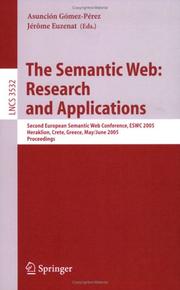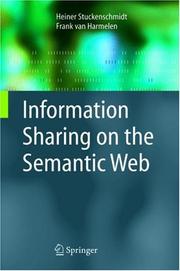| Listing 1 - 10 of 15 | << page >> |
Sort by
|

ISBN: 9780262012423 0262012421 Year: 2008 Publisher: Cambridge, Mass. : MIT Press,
Abstract | Keywords | Export | Availability | Bookmark
 Loading...
Loading...Choose an application
- Reference Manager
- EndNote
- RefWorks (Direct export to RefWorks)
Computer architecture. Operating systems --- Semantic Web. --- Web sémantique --- Semantic web --- Web sémantique

ISBN: 0387302395 9780387302393 1441940170 9786610724208 128072420X 0387346856 9780387346854 Year: 2006 Volume: 3 Publisher: New York : Springer,
Abstract | Keywords | Export | Availability | Bookmark
 Loading...
Loading...Choose an application
- Reference Manager
- EndNote
- RefWorks (Direct export to RefWorks)
Semantics, Web services, and Web processes promise better re-use, universal interoperability and integration. Semantics has been recognized as the primary tool to address the challenges of a broad spectrum of heterogeneity and for improving automation through machine understandable descriptions. Semantic Web Services, Processes and Applications brings contributions from researchers who study, explore and understand the semantic enabling of all phases of semantic Web processes. This encompasses design, annotation, discovery, choreography and composition. Also this book presents fundamental capabilities and techniques associated with ontological modeling or services, annotation, matching and mapping, and reasoning. This is complemented by discussion of applications in e-Government and bioinformatics. Semantic Web Services, Processes and Applications is structured for research scientists and graduate-level students in computer science, as well as practitioners in industry.
Semantic web --- Web services --- Semantic Web. --- Web services. --- Semantic Web --- Web sémantique --- Services Web --- EPUB-LIV-FT SPRINGER-B
Book
ISBN: 9791097088590 Year: 2023 Publisher: Paris : Éditions Divergences,
Abstract | Keywords | Export | Availability | Bookmark
 Loading...
Loading...Choose an application
- Reference Manager
- EndNote
- RefWorks (Direct export to RefWorks)
Bitcoin et les « monnaies » magiques d’Internet suscitent un engouement souvent teinté de fanatisme mais aussi la défiance, voire le rejet. Pour apporter un éclairage critique sur le phénomène des « cryptomonnaies », ce livre parcourt le Globe, depuis les Cypherpunks californiens, le white paper de Satoshi Nakamoto, les « mines» de Bitcoin du Kazakhstan et du Texas, jusqu'aux offensives crypto au Salvador, à Porto Rico ou en Afrique. Il lève le voile sur les échecs économiques d'une industrie qui a accouché de nombreux scandales ainsi que sur l’aberration écologique qu’elle représente. Ces récits fournissent aussi l’occasion d’analyser les soubassements idéologiques d’une technologie que ses détracteurs désignent comme un cheval de Troie pour la pensée réactionnaire.
Bitcoin --- Electronic funds transfers --- Bitcoin. --- Cryptomonnaie --- Économie numérique. --- Web sémantique. --- Aspect politique. --- Aspect environnemental.

ISSN: 03029743 ISBN: 3540261249 9783540261247 3540315470 Year: 2005 Volume: 3532 Publisher: Berlin ; New York : Springer,
Abstract | Keywords | Export | Availability | Bookmark
 Loading...
Loading...Choose an application
- Reference Manager
- EndNote
- RefWorks (Direct export to RefWorks)
This volume contains the papers presented at the 2nd European Semantic Web Conference (ESWC 2005) held in Heraklion, Crete, Greece, from 29th May to 1st June, 2005. The vision of the Semantic Web is to enhance today’s Web via the exploi- tion of machine-processable metadata. The explicit representation of the sem- tics of data, accompanied with domain theories (ontologies), will enable a web that provides a qualitatively new level of service. It will weave together an - crediblylargenetworkofhumanknowledgeandwillcomplementitwithmachine processability. Various automated services will help the user to achieve goals by accessing and providing information in a machine-understandable form. This process may ultimately create extremely knowledgeable systems with various specialized reasoning services systems. Many technologies and methodologies are being developed within arti?cial intelligence, human language technology, machine learning, databases, software engineering and information systems that can contribute to the realization of this vision. The 2nd Annual European Semantic Web Conference presented the latest results in research and applications of Semantic Web technologies. Following the success of the ?rst edition, ESWC showed a signi?cant increase in participation. With148submissions,thenumberofpapersdoubledthatofthepreviousedition. Each submission was evaluated by at least three reviewers. The selection process resulted in the acceptance of 48 papers for publication and presentation at the conference (an acceptance rate of 32%). Papers did not come only from Europe but also from other continents.
Semantic Web --- Ontology --- Knowledge management --- Web sémantique --- Ontologie --- Congresses. --- Congrès --- EPUB-LIV-FT SPRINGER-B --- Semantic Web - Congresses --- Ontology - Congresses --- Knowledge management - Congresses
Book
ISBN: 9782765414179 2765414173 Year: 2013 Volume: *122 Publisher: Paris Éditions du Cercle de la librairie
Abstract | Keywords | Export | Availability | Bookmark
 Loading...
Loading...Choose an application
- Reference Manager
- EndNote
- RefWorks (Direct export to RefWorks)
Présentation des différentes briques technologiques qui constituent le web sémantique. La première partie explique les objectifs et les promesses du web de données pour les bibliothèques, la seconde présente quatre cas pratiques d'application à leur usage : publier des données en RDF, enrichir les pages web, agréger les données, lier les données avec le LED (linked enterprise data).
Computer architecture. Operating systems --- Semantic Web --- Metadata --- Digital libraries --- Web sémantique --- Métadonnées --- Bibliothèques virtuelles --- Semantic web --- Semantic networks (Information theory) --- Information retrieval --- Study and teaching --- AA / International- internationaal --- P01 - Droit de l'informatique - Informaticarecht --- Web sémantique --- Métadonnées --- Bibliothèques virtuelles --- Digital libraries. --- Information retrieval - Study and teaching
Book
ISBN: 9782746223615 2746223619 Year: 2010 Publisher: Paris : Hermès science publications : Lavoisier,
Abstract | Keywords | Export | Availability | Bookmark
 Loading...
Loading...Choose an application
- Reference Manager
- EndNote
- RefWorks (Direct export to RefWorks)
La prolifération logicielle (interfaces, moteurs de recherche...) et les écritures du Web se combinent aujourd'hui au traitement automatique d'un nombre toujours plus grand de tâches cognitives et de pratiques intellectuelles. Elles induisent de nouvelles économies des savoirs. L'ouvrage l'illustre à travers divers exemples : espace sémantique IEML, capture sémantique, Web statique et dynamique...
Communication --- Distributed artificial intelligence --- Semantic Web --- Artificial intelligence --- Technological literacy --- Technologies de l'information et de la communication --- Intelligence artificielle répartie --- Web sémantique --- Intelligence artificielle --- Culture technologique --- Technological innovations --- Information technology --- Semantic web --- Information technologies --- Intelligence artificielle répartie --- Web sémantique --- Artificial intelligence. --- Communication - Technological innovations
Book
ISBN: 9782707171351 2707171352 Year: 2012 Publisher: Paris : La Découverte,
Abstract | Keywords | Export | Availability | Bookmark
 Loading...
Loading...Choose an application
- Reference Manager
- EndNote
- RefWorks (Direct export to RefWorks)
A partir d'une histoire du document et de son analyse tridimensionnelle (la forme, le contenu, la transmission), l'auteur constate que le Web, s'inspirant du modèle de la bibliothèque et de celui de la radiotélévision, cherche à répondre aux aspirations documentaires d'une société en pleine évolution. Le Web modifie le document dans ses trois dimensions, faisant de l'individu même un document.
Internet searching --- Web search engines --- Electronic filing systems --- Digital preservation --- Semantic Web --- Computer network resources --- Electronic publications --- Recherche sur Internet --- Moteurs de recherche sur Internet --- Archivage électronique --- Numérisation --- Web sémantique --- Information électronique --- Publications électroniques --- Documentation --- Information science --- Information technology --- Archivage électronique --- Numérisation --- Web sémantique --- Information électronique --- Publications électroniques

ISBN: 9783540205944 9783642058233 9783540269076 3540205942 Year: 2005 Publisher: Berlin : Springer,
Abstract | Keywords | Export | Availability | Bookmark
 Loading...
Loading...Choose an application
- Reference Manager
- EndNote
- RefWorks (Direct export to RefWorks)
Aboutthebook The success of the information society The rapid progress of the information society in the past decade has been made possible by the removal of many technical barriers. Producing, storing, and transporting information in large quantities are no longer signi?cant problems. Producing on-line, digitized information is no longer a problem. Ever more of our commercial, scienti?c and personal information exchanges happen on-line in digital form. In the professional domain, near 100% of all o?ce documents areproducedindigitalform(evenifafterwardstheyaredistributedinpaper form), large parts of the scienti?c discourse are now taking place in digital form (with physics, computer science and astronomy taking a leading role). In the public domain, newspapers are available on-line, an increasing number of radio and television stations o?er their material on-line in streaming form and e-government is an important theme for public administration. Even in the personal area, information is rapidly moving on-line: sales of digital cameras are now higher then for analogue cameras, e-mail and on-line chat have become important channels for maintaining social relations and for personal entertainment the digital DVD is rapidly replacing the analogue video tape. Compact disk (itself already digital) is under serious pressure from on-line music in MP3 format from a variety of sources. In short: p- ductionofon-lineinformationisnowthenorminvirtuallyallareasofourlife. Storing such information in the required volumes is also no longer a problem.
Information systems --- Semantic web --- Ontologies (Information retrieval) --- Knowledge management --- Semantic integration (Computer systems) --- Information retrieval --- Information organization --- Semantic Web --- Recherche de l'information --- Organisation de l'information --- Web sémantique --- EPUB-LIV-FT LIVINFOR SPRINGER-B --- Knowledge management. --- Ontologies (Information retrieval). --- Semantic Web.
Multi
ISBN: 9781856049092 1856049094 9781856047456 1856047458 Year: 2011 Publisher: London : Facet,
Abstract | Keywords | Export | Availability | Bookmark
 Loading...
Loading...Choose an application
- Reference Manager
- EndNote
- RefWorks (Direct export to RefWorks)
The web is changing from a web of documents to a web of data; from a web that can be read by humans, to one that can be read by machines. These are fascinating advances for anyone interested in the changing nature of the web and the way we access information. The technologies being forged in this new landscape will provide a host of opportunities for library and information professionals to shape the information landscape of the future. This book is a wide-ranging introduction to the emerging web of data and the semantic web, exploring technologies including APIs, microformats and linked data. Its topical commentary and practical examples drawn from the international LIS community explore how information professionals can harness the power of this new phenomenon to inform strategy and become facilitators of access to data. Key topics covered include: open data: a semantic web - one that's meaningful to computers data silos; the semantic web- the RDF vision embedded semantics; and, the library and the web of data the future of the librarian and the web of data. This is essential reading for library and information professionals and for LIS students and researchers. It will also be of value to information architects, web developers and all those interested in making sure that people have access to the information they need.
Electronic information resources --- Collection management (Libraries) --- Semantic Web --- Sources d'information électroniques --- Gestion des collections (Bibliothèques) --- Web sémantique --- Access control. --- Accès --- Contrôle --- Information retrieval --- Computer architecture. Operating systems --- Semantic Web. --- Web databases. --- Semantics --- Data processing. --- Semantic web --- Web databases
Book
ISBN: 9782415007980 2415007986 Year: 2024 Publisher: Paris : Odile Jacob,
Abstract | Keywords | Export | Availability | Bookmark
 Loading...
Loading...Choose an application
- Reference Manager
- EndNote
- RefWorks (Direct export to RefWorks)
Depuis toujours, les humains ont su gérer collectivement des ressources, les partager. On parle alors de communs : des ressources partagées, gérées et entretenues par une communauté qui établit leurs règles d’utilisation. Les communs trouvent dans le numérique une puissance incroyable, avec de superbes réussites comme les logiciels libres, Wikipédia, le Web, la science ouverte et de nombreuses autres. Pourquoi le numérique est-il si bien adapté aux communs ? D’abord, parce qu’un bien numérique est a priori non rival : sa consommation par un individu ne retire rien aux autres individus. Et puis parce que le numérique favorise des partages massifs de données, d’informations, de connaissances. Toutefois, en dépit de leurs brillantes réussites, les modèles économiques des communs numériques sont parfois fragiles, leur gouvernance délicate, et la coexistence avec le monde du privé ne va pas sans frictions.
Société numérique --- Technologies de l'information et de la communication --- Open source software --- Semantic Web --- Internet --- Information society --- Logiciels libres. --- Web sémantique. --- Science ouverte. --- Données ouvertes. --- Société numérique. --- Government policy --- Economic aspects --- Politique publique. --- Aspect économique. --- Wikipédia. --- Wikipedia. --- Government policy. --- Economic aspects. --- Aspect économique
| Listing 1 - 10 of 15 | << page >> |
Sort by
|

 Search
Search Feedback
Feedback About
About Help
Help News
News